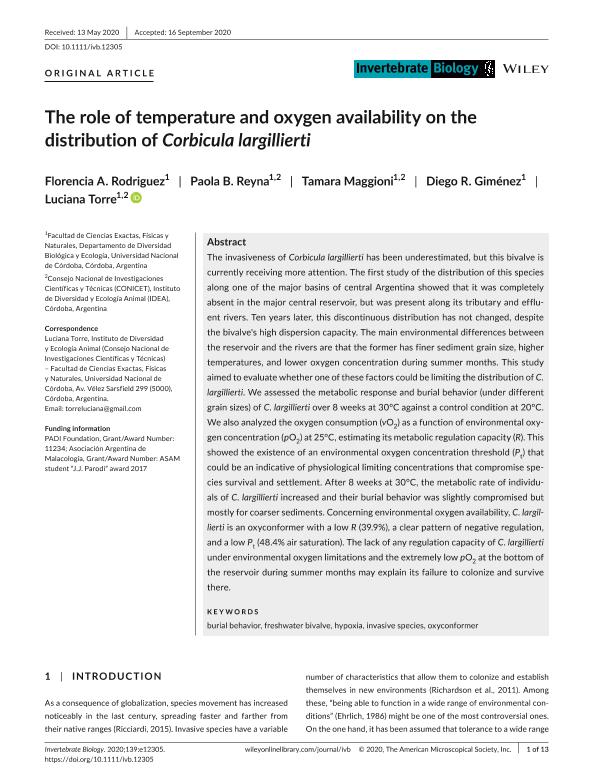Mostrar el registro sencillo del ítem
dc.contributor.author
Rodriguez, Florencia Anahi

dc.contributor.author
Reyna, Paola Beatriz

dc.contributor.author
Maggioni, Tamara

dc.contributor.author
Gimenez, Diego R.
dc.contributor.author
Torre, Luciana

dc.date.available
2021-10-06T20:50:07Z
dc.date.issued
2020-12-17
dc.identifier.citation
Rodriguez, Florencia Anahi; Reyna, Paola Beatriz; Maggioni, Tamara; Gimenez, Diego R.; Torre, Luciana; The role of temperature and oxygen availability on the distribution of Corbicula largillierti; Wiley Blackwell Publishing, Inc; Invertebrate Biology; 139; 4; 17-12-2020; 1-13
dc.identifier.issn
1077-8306
dc.identifier.uri
http://hdl.handle.net/11336/142984
dc.description.abstract
The invasiveness of Corbicula largillierti has been underestimated, but this bivalve is currently receiving more attention. The first study of the distribution of this species along one of the major basins of central Argentina showed that it was completely absent in the major central reservoir, but was present along its tributary and effluent rivers. Ten years later, this discontinuous distribution has not changed, despite the bivalve's high dispersion capacity. The main environmental differences between the reservoir and the rivers are that the former has finer sediment grain size, higher temperatures, and lower oxygen concentration during summer months. This study aimed to evaluate whether one of these factors could be limiting the distribution of C. largillierti. We assessed the metabolic response and burial behavior (under different grain sizes) of C. largillierti over 8 weeks at 30°C against a control condition at 20°C. We also analyzed the oxygen consumption (vO2) as a function of environmental oxygen concentration (pO2) at 25°C, estimating its metabolic regulation capacity (R). This showed the existence of an environmental oxygen concentration threshold (Pt) that could be an indicative of physiological limiting concentrations that compromise species survival and settlement. After 8 weeks at 30°C, the metabolic rate of individuals of C. largillierti increased and their burial behavior was slightly compromised but mostly for coarser sediments. Concerning environmental oxygen availability, C. largillierti is an oxyconformer with a low R (39.9%), a clear pattern of negative regulation, and a low Pt (48.4% air saturation). The lack of any regulation capacity of C. largillierti under environmental oxygen limitations and the extremely low pO2 at the bottom of the reservoir during summer months may explain its failure to colonize and survive there.
dc.format
application/pdf
dc.language.iso
eng
dc.publisher
Wiley Blackwell Publishing, Inc

dc.rights
info:eu-repo/semantics/openAccess
dc.rights.uri
https://creativecommons.org/licenses/by-nc-sa/2.5/ar/
dc.subject
BURIAL BEHAVIOR
dc.subject
FRESHWATER BIVALVE
dc.subject
HYPOXIA
dc.subject
INVASIVE SPECIES
dc.subject
OXYCONFORMER
dc.subject.classification
Biología Marina, Limnología

dc.subject.classification
Ciencias Biológicas

dc.subject.classification
CIENCIAS NATURALES Y EXACTAS

dc.title
The role of temperature and oxygen availability on the distribution of Corbicula largillierti
dc.type
info:eu-repo/semantics/article
dc.type
info:ar-repo/semantics/artículo
dc.type
info:eu-repo/semantics/publishedVersion
dc.date.updated
2021-09-06T15:41:00Z
dc.identifier.eissn
1744-7410
dc.journal.volume
139
dc.journal.number
4
dc.journal.pagination
1-13
dc.journal.pais
Reino Unido

dc.journal.ciudad
Londres
dc.description.fil
Fil: Rodriguez, Florencia Anahi. Universidad Nacional de Córdoba; Argentina
dc.description.fil
Fil: Reyna, Paola Beatriz. Consejo Nacional de Investigaciones Científicas y Técnicas. Centro Científico Tecnológico Conicet - Córdoba. Instituto de Diversidad y Ecología Animal. Universidad Nacional de Córdoba. Facultad de Ciencias Exactas Físicas y Naturales. Instituto de Diversidad y Ecología Animal; Argentina
dc.description.fil
Fil: Maggioni, Tamara. Consejo Nacional de Investigaciones Científicas y Técnicas. Centro Científico Tecnológico Conicet - Córdoba. Instituto de Diversidad y Ecología Animal. Universidad Nacional de Córdoba. Facultad de Ciencias Exactas Físicas y Naturales. Instituto de Diversidad y Ecología Animal; Argentina
dc.description.fil
Fil: Gimenez, Diego R.. Universidad Nacional de Córdoba. Facultad de Ciencias Exactas, Físicas y Naturales; Argentina
dc.description.fil
Fil: Torre, Luciana. Consejo Nacional de Investigaciones Científicas y Técnicas. Centro Científico Tecnológico Conicet - Córdoba. Instituto de Diversidad y Ecología Animal. Universidad Nacional de Córdoba. Facultad de Ciencias Exactas Físicas y Naturales. Instituto de Diversidad y Ecología Animal; Argentina
dc.journal.title
Invertebrate Biology

dc.relation.alternativeid
info:eu-repo/semantics/altIdentifier/doi/http://dx.doi.org/10.1111/ivb.12305
dc.relation.alternativeid
info:eu-repo/semantics/altIdentifier/url/https://onlinelibrary.wiley.com/doi/10.1111/ivb.12305
Archivos asociados
